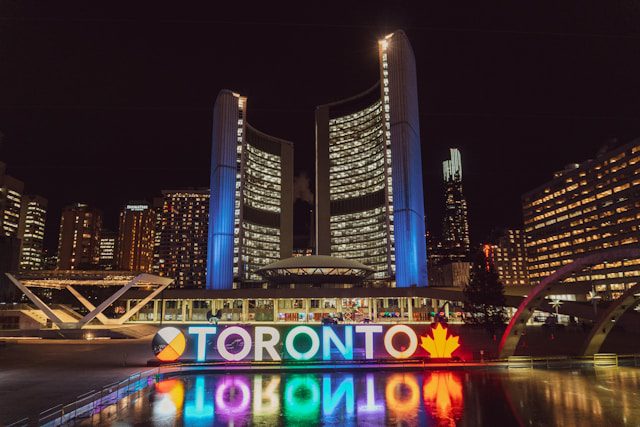International students who wish to get permanent residency after studying in Canada have a variety of options. The canadian permanent residence application (PR application) is covered in this post.
This idea may have occurred to any international students studying in Canada, either intentionally or accidentally. So, how can one obtain permanent residency after studying in canada? Is that even possible for you?
In a nutshell, the answer is yes. Furthermore, despite the large number of students entering Canada, many are unaware of how simple it is for foreign students to obtain permanent residence.
International students have access to immigration and educational choices in Canada. Canada is regarded as one of the greatest places in the world to live, work, and study.
It is renowned for providing equal opportunity to all. Canada offers opulent living conditions, first-rate educational possibilities across various subjects, institutions, and several professional paths. The nation’s immigration-friendly policies contribute to its popularity among students.
Therefore, making the most of those can only help to ensure your future. This post covers everything you know about how to become a Canadian Permanent Resident after the Studies. First, Let’s define a Canada PR visa and its benefits.
What is a Permanent Resident Visa for Canada?
A Canadian Permanent Resident Visa is a legitimate permission to work and settle in Canada. Consequently, anyone holding a Canada Permanent resident visa can reside in Canada lawfully. They are not, however, regarded as Canadian native citizens. The Canadian government grants them the status of permanent residents (Canadian permanent residency for students).

Understanding Canada’s permanent residence requirements is crucial before beginning the application process.
Immigration programs allow international students to apply for permanent residence based on their job experience, education, and talents, enabling them to get PR in Canada. You must apply for this through Immigration, Refugees, and Citizenship Canada (IRCC).
Benefits of obtaining permanent residence for overseas students in Canada
Everyone may agree that Permanent residency for international students in Canada can lead to many chances.
The following are some benefits of Permanent residency for overseas students studying in Canada:
1. Reside and Earn a Living in Canada
The main advantage of a permanent resident visa is the ability to secure permanent residency post-study in canada, live and work in Canada. Once you have permanent residence, you can travel to any Canadian region. You are not required to remain with a job, an employer, or a province.
The best thing about it is that, with your permanent residency status, you can seek Canadian citizenship after spending five years in the country. Thus, there is a win-win scenario.
2. Renew or Extend Your Visa
The best way to gain security access is with a Canada PR visa. In contrast to complex procedures in other countries, Canadian residents can extend their visa status indefinitely.
Thus, the five-year expiration time isn’t a restriction. After a few significant years, you don’t have to worry about being ejected; by adhering to all the rules, you can renew your permit. This highlights even more the advantages of remaining in Canada.
And to top it all off, if you’ve spent 1,095 days (or three years) physically residing in Canada during your five years as a permanent resident, you can also petition for citizenship.
3. Make a way for your family
Everyone searches for methods to give their family security. This is unquestionably accurate when navigating the Canadian PR procedure following a study in Canada. Once you meet the conditions to become a permanent resident of Canada, you can bring your family with you.
You can even sponsor certain residents if you meet the requirements and are older than eighteen.
The Canadian Permanent Residency Pathways
Now that you know the importance of Canadian permanent residence, let’s examine the application procedure. The Permanent residency pathways in Canada is truly diverse. This implies that individuals might experiment with various methods depending on their present situation and Canada’s permanent residency requirements.

Some of the Canadian Permanent residency pathways are listed below:
1. The Canadian Experience Class
The Canadian Experience Class (CEC) program is administered through the Express Entry immigration system. It is also one of the quickest ways to obtain Canadian permanent status. Your age, degree of education, and language proficiency test determine your eligibility for this program.
To be considered, applicants must prove they have completed three years of continuous, full-time, skilled job experience in Canada or an equivalent amount of part-time experience.
For an overseas student with some work experience, the CEC can be a great immigration alternative.
Work experience completed while enrolled full-time in school is not applied toward the 12-month requirement. Therefore, international students cannot use work experience obtained during a student’s education to fulfil the CEC requirement.
2. Federal Skilled Worker (FSW) Program
The Express Entry immigration system also governs the Federal Skilled Worker (FSW) program, which can be a fantastic option for certain international school graduates. Unlike the Canadian Experience Class (CEC), FSW does not require Canadian job experience, making it a good choice for recent international graduates who have obtained relevant work experience elsewhere.
The FSW program is a merit-based immigration scheme that compares applicants to one another using a points-based Comprehensive Ranking System (CRS) score. Only the most competitive profiles are asked to apply for permanent residency.
FSW can be a great way to obtain permanent residency if you’re an international student who meets the requirements for PR and has a competitive profile in the CRS score system.
3. Provincial Nominee schemes (PNPs)
Each province and territory in Canada administers its immigration schemes known as Provincial Nominee schemes (PNPs). The PNP programs operate in different ways depending on the province or territory. Candidates having ties to the province (such as prior education or work experience) are frequently given a favour by PNPs.
Depending on the province where they finished their program of study, an international student may be qualified to apply for a PNP there.
4. Post-graduation work visa
A post-graduation work visa is a deceptive route to permanent residence. After completing their education at a designated learning institution (DLI), most international students can remain in Canada and work for any company there.
Through the Canadian Experience Class (CEC) or a Provincial Nominee Program supported by an employer, this experience can help someone qualify for permanent residency in Canada (PNP).
5. Options for Immigration to Quebec
Regarding immigration, Quebec has its own set of regulations with distinct guidelines and processes from the rest of the nation. Nonetheless, the immigration laws in Quebec and the rest of Canada are set up to give international students a leg up when applying for permanent residency.
Specifically designed for international students, Quebec’s two primary programs for permanent residence offer the following streams:
6. Quebec Skilled Worker
Quebec Skilled Worker (QSW) program participants who are international students who have earned or are pursuing a Quebec certificate are ideal candidates.
Candidates for QSW do not need to have a minimum level of French proficiency, but they do need to receive a minimum score on the program’s points evaluation grid.
Requirements for Canada Permanent residency in Canada
As you can see, obtaining permanent residence in Canada is relatively easy, provided you are aware of the conditions. You should be aware that depending on the applicant’s chosen immigration pathway, permanent residency procedures vary in Canada. Consequently, the Canada Permanent residency requirements depend on the program an applicant chooses.

The following are necessary qualifying requirements for a Canada PR visa:
- Evidence that you have enough money to sponsor your Application and remain in Canada
- Educational Credentials Assessment (ECA)
- Documentation supporting your visa application in both original copy and official translation
- Language exam results
- Required Academic Credential
- Test of Skills Assessment
- By visiting their official website, you can obtain additional information on the Application for a PR card.
Documents needed for a permanent residence permit in Canada
The following collection of documents can help expedite your PR application procedure in Canada:
- Transcripts of Education
- Work Experience Letters
- Suitable WES reports
- Results of IELTS Scores
- Authentic Passport
- Evidence of Police and Medical Clearance
- Verification of identification
What is the price of Canadian Permanent Residency?
The application fee for permanent residence in Canada is CAD 825.25. This also applies to secondary applicants, such as your spouse. The cost is CAD 225 for dependent children under the age of 22. Additional expenses, which may vary depending on the situation, will be incurred during the application and processing phases.
With the help of Post-Graduation Work Permits (PGWP), international students who have completed their studies at a Designated Learning Institution (DLI) in Canada are able to obtain both work experience and an open work visa.
International students with an open work permit can work for any employer, wherever they choose. The PGWP creates chances for Canadian work experience and is valid for eight months to three years.
Qualifications for Post-Graduation Work Permits (PGWP)
Before applying for a PGWP, a candidate must meet the following requirements:
- They have to be at least eighteen years old.
- They must have studied full-time in a program for at least eight months in Canada.
- The study course had to be finished at a DLI.
- International students have 180 days after finishing their degree or course to apply for a PGWP.
When a student’s study permit is set to expire, they need to apply for PGWP after obtaining visitor status.
PGWP applicants who submit their applications before their study permit expires are eligible to start working full-time as soon as they are approved.
Changing to a Work Permit Before Finishing Your Studies
An evaluation of the labor market impact is required of international students who choose to drop out of school and obtain a work permit (LMIA).

However, suppose these students wish to cease their studies and submit an application for a work visa. In that case, they must notify Immigration, Refugees, Citizenship, Canada (IRCC).
If their status changes, international students might have to depart the nation before receiving their work visa. The international student needs a legitimate job offer from a company to get an LMIA, and the employer needs to back the student’s work permit application.
The business has to demonstrate that it needs help locating a permanent resident or a citizen of Canada to take up the position. A closed LMIA, instead of an open PGWP, enables a student to be associated with a particular position, location, and employer.
Frequently Asked Questions on How to Get Your PR After Completing Studies in Canada
When can students in Canada apply for permanent residence?
The duration required for students to obtain permanent residence in Canada is contingent upon the chosen immigration scheme. But the Express Entry Program takes the quickest route into account. It will take you sixty days to submit your completed Application, and it will take six months to process it overall.
Does Studying in Canada Count Towards Citizenship?
No, studying in Canada alone does not count towards citizenship. Citizenship eligibility involves meeting specific residency and other requirements.
Can I Get PR After Studying in Canada?
Yes, Canada offers the Post-Graduation Work Permit (PGWP) program, which can lead to permanent residency opportunities for eligible candidates.
What is Canada’s quickest path to permanent residence?
The Express Entry Program is the quickest route to permanent residence for international students studying in Canada. You can get around the strict requirement of working and residing in Canada for some time by applying for permanent residency through the Federal Skilled Worker Program or the Federal Skilled Trades Program. With the FSWP and FSTP, work experience in Canada is not a requirement.
How can a student in Canada obtain permanent residence?
International students who meet all the requirements of the immigration program they are applying for are eligible to apply for permanent residence either while they are enrolled in school or after graduation.
International students in Canada can apply for permanent residence in several ways. Every program exists to facilitate the applicant’s PR process in Canada.
After studying, is obtaining permanent residence in Canada easy?
It is indeed simple to obtain a permanent resident visa for Canada. This is due to the multiple immigration routes available to those seeking permanent residence in Canada. This allows individuals to select the program that best suits their needs.
Many people’s permanent residency journeys and requirements have been encouraged and facilitated by their studies as overseas students.
How Can I Get a Green Card After Studying in Canada?
Canada does not issue green cards; instead, it offers permanent residency. Explore pathways like Express Entry or Provincial Nominee Programs (PNP) for PR after studying.
How Can I Get Citizenship in Canada After Studying?
Citizenship requires meeting residency, language, and other criteria. After obtaining PR, you can apply for citizenship after a specified period of residence.
Which Province in Canada is Easiest to Get PR After Study?
Provincial Nominee Programs (PNPs) vary, but provinces like Ontario, British Columbia, and Alberta are known for offering PR opportunities for international graduates.
Are There Scholarships Specifically Aimed at International Students in Canada?

Yes , there are scholarship opportunities designed for international students pursuing higher education in Canada to ease financial burdens
Final Words
It isn’t very comforting to step foot in a foreign country. However, this experience will make you a strong, self-reliant individual who can easily conquer obstacles. Your journey to Canada as an exchange student demonstrates your dedication to a safe future. The potential to obtain a permanent residency visa opens up even more opportunities for academic and professional achievement.
Therefore, when organizing your permanent residency visa process in Canada, remember the points above. and achieve success by carefully arranging your strategy and meeting all Canadian Permanent residency visa criteria. Feel free to consult with our in house work and study abroad consultants.


